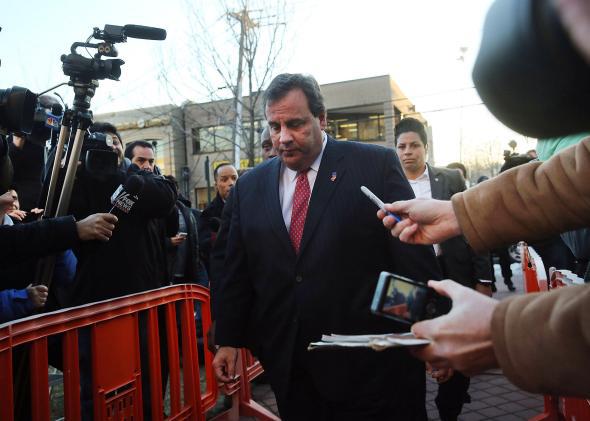As New Jersey Gov. Chris Christie tries to recover from the fallout for his administration’s participation in the vindictive decision to close lanes and snarl traffic on the George Washington Bridge for five days, he will get no help from lawsuits brought by angry citizens stuck in the mess. The first suit has already dropped. These claims will surely breed others. They could keep the story alive for years. And they could even result, unusually, in personal liability for the officials involved, including, perhaps, the governor himself.
There are three broad categories of cases that could be brought in connection with the bridge imbroglio. The first, and most dramatic, would involve people who could show they needlessly suffered aggravated injuries when ambulances couldn’t get to them quickly. (Relatives of a 91-year-old woman who died in transit don’t blame the delay, but others might.) If someone could prove they suffered serious harm for this reason, the effect would be politically as well as legally devastating to the Christie administration. But so far, no such claim has come to light.
The case filed late last week, Galicki v. New Jersey, highlights the other two types of likely claims. The suit was brought by six plaintiffs who claim to have suffered both emotional distress and economic loss from being stuck in traffic for hours. Plaintiff Joy Galicki said in an interview that her husband had to pull the car over so she could vomit from the panic attack she was experiencing. This claim faces long odds because courts allow recovery only for severe distress that effectively prevents a person from carrying out normal activities. A traffic tie-up is a pretty unlikely source of such an extreme reaction. So in general, claims for emotional distress caused by the lane closures on the bridge look weak.
Galicki’s economic loss claims, by contrast, could be a real headache for the Christie administration. The plaintiffs say that the delays cost them wages and other income. (They don’t say what kind, and weirdly, two of them work for the attorney who’s representing them.)
The losses for these six plaintiffs may well amount to peanuts, but in the aggregate, economic loss claims of this sort would quickly add up because of the sheer volume of traffic that was affected. The George Washington Bridge carries about 300,000 vehicles each day. Think about how the five days of long delays might have affected commerce: deliveries that were late or missed from trucks that couldn’t get through, lost clients or wages for people who couldn’t get to work.
Would they win? Usually, suits like these fail, because courts don’t like claims for pure economic loss. But in the case of the bridge tie-up, success is much likelier, for a few reasons.
First, the plaintiffs would be more likely to clear the hurdle of government immunity. Like most states, New Jersey and its state officials are immune from many claims for which ordinary citizens would be liable—as long as they are acting in good faith. If the bureaucrats had just misjudged whether they really needed a traffic pattern study, they’d be off the hook—that’s just an honest mistake. Here, though, the leaked emails make the lane closures seem like the very definition of bad faith. And officials who acted maliciously in causing the tie-up could be held personally liable. New Jersey itself might not be, because criminal and malicious acts are the responsibility of the individual, not the state. But even that’s not a sure bet, since the state can also be liable for negligently supervising its employees.
Another possible obstacle stems from basic rules of tort law. Generally, one can recover for personal injury or property damage but not for pure economic loss. If a building collapses because of a contractor’s negligence, anyone injured or killed as a result has a claim, as does any nearby store owner whose property was damaged by falling brick. But if the city then has to rope off several blocks during the repair work, the restaurants that lose business as a result are out of luck. That’s because courts worry that the theory for allowing recovery has no logical stopping point. It’s not just restaurants that lose business or income when the street’s closed, but also their suppliers, the people who work there, and so on.
Usually the rule against recovering for economic loss makes sense, but it probably won’t block lawsuits like Galicki, for two reasons. First, the rule applies in cases of negligence, and the misconduct in this case appears to be intentional. One way to prove intent is to show that the defendant “knew with substantial certainty” that a given result would occur, and it’s clear that the shenanigans ordered up here were sure to cause major business disruptions.
What’s more, New Jersey is particularly hospitable to economic loss claims. In a 1985 case, People Express Airlines v. Consolidated Air Corp., the New Jersey Supreme Court broke from almost all of its sister courts and held that, under certain limited circumstances, even a negligent party could be liable for economic losses. That case was about a toxic chemical spill that led the airline that sued to evacuate its nearby business office for 12 hours, resulting in delayed and canceled flights and bookings. The court criticized the blanket rule against recovery and stated that “those responsible for the wrong should bear the cost“ of it. That’s a good line for people who sue over the bridge tie-up to quote.
As the prominent torts scholar Robert Rabin has noted, People Express stands as a “lonely outpost” almost 30 years after it was decided. Even the New Jersey Supreme Court itself has mostly ignored it. Still, the ruling remains on the books, and state officials might find that they’ve given the court the chance to breathe new life into it. Maybe state officials will have to pay for the negative social costs of economic losses—especially since they were the result of a petty political vendetta.
